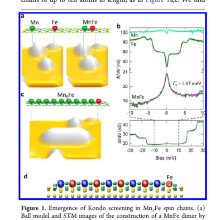Link to publication: http://pubs.acs.org/doi/10.1021/acs.nanolett.7b02882
Abstract
The creation of molecule-like structures in which magnetic atoms interact controllably is full of potential for the study of complex or strongly correlated systems. Here, we create spin chains in which a strongly correlated Kondo state emerges from magnetic coupling of transition-metal atoms. We build chains up to ten atoms in length by placing Fe and Mn atoms on a Cu2N surface with a scanning tunneling microscope. The atoms couple antiferromagnetically via superexchange interaction through the nitrogen atom network of the surface. The emergent Kondo resonance is spatially distributed along the chain. Its strength can be controlled by mixing atoms of different transition metal elements and manipulating their spatial distribution. We show that the Kondo screening of the full chain by the electrons of the nonmagnetic substrate depends on the interatomic entanglement of the spins in the chain, demonstrating the prerequisites to build and probe spatially extended strongly correlated nanostructures.


